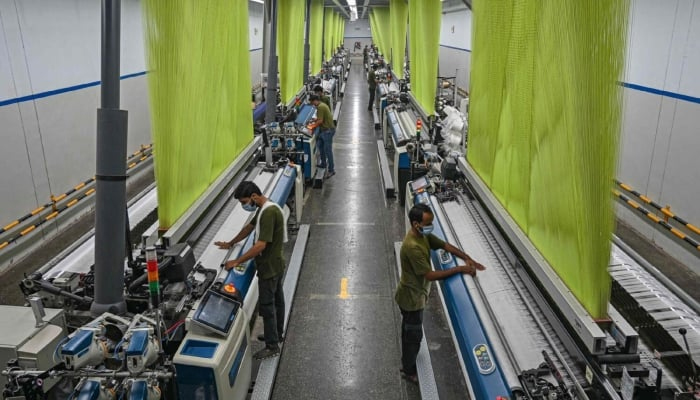Capital suggestion: Industrial policy?
Our industrial history is witness that status quo has favoured select few, leaving smaller enterprises grossly marginalised
Three questions: can industrialists be impartial architects of change when they have reaped the benefits of the existing system? Will industrialists, who have thrived within the current status quo, suggest radical reforms needed for the future? Can a committee primarily driven by profit motives be the torchbearer for change?
Yes, we must draw upon the expertise of those deeply entrenched in Pakistan’s industrial sector. Yes, industrialists bring a wealth of experience and insights to the table. Yes, their expertise in navigating the complexities of business and understanding market dynamics is invaluable. Yes, the formation of a committee predominantly comprising industrialists to design the industrial policy warrants scrutiny.
To begin with, there is a risk of inherent bias. Industrialists who have flourished within the current industrial landscape laden with subsidies and grants will most certainly be hesitant to advocate for radical reforms that will disrupt their established positions. The fear of jeopardizing their vested interests will definitely hinder the committee from proposing transformative measures that are necessary to address the evolving needs of Pakistan's economy.
Second, the industrialists' perspective will be confined to the immediate benefits of their enterprises, potentially overlooking the broader socio-economic challenges faced by the country. Genuine industrial reform will require three things: must consider equitable distribution of resources, welfare of workers, and environmental sustainability. Can a committee primarily motivated by profit serve as the vanguard for driving change?
Our industrial history is witness that the status quo has favoured a select few, leaving smaller enterprises grossly marginalized. While large industrialists have thrived, many small and medium-sized businesses continue to struggle to compete on a playing field that is uneven. Can a policy devised by those who have profited from this imbalance effectively rectify the inherent flaws in our industrial trajectory?
Pakistan's industrial landscape is at a crossroads, facing challenges such as high input costs, technological disruptions, environmental crises, and global economic shifts. The urgency of radical reform cannot be overstated. A policy crafted by a committee of visionaries, unencumbered by the fear of disrupting the status quo, is imperative to navigate these complexities successfully.
To catalyze authentic progress, analogous committees in Vietnam, Bangladesh, South Korea, Ethiopia, and Colombia embraced a broad spectrum of voices, incorporating perspectives from practitioners, academics, economic think tanks, sustainability experts, labor unions, technology and innovation hubs. Inclusivity is pivotal to ensuring that the industrial policy transcends being a mere extension of current power structures and evolves into a dynamic framework that uplifts the entirety of stakeholders. Industrial policy must be ‘action-oriented’ and targeted ‘towards a subset of industries that have comparative advantage’.
Yes, industrialists bring valuable insights to the table but the formation of a committee exclusively comprising industrialists to formulate Pakistan's industrial policy raises concerns about potential biases and a lack of inclusivity. To truly propel the nation towards a robust industrial future, we must embrace a collaborative approach that involves diverse perspectives and prioritizes the long-term welfare of the entire nation over short-term gains for a select few.
The writer is a columnist based in Islamabad. He tweets/posts @saleemfarrukh and can be reached at: farrukh15@hotmail.com
-
 Why Prince William Releases Statement On Epstein Scandal Amid Most 'challenging' Diplomatic Trip?
Why Prince William Releases Statement On Epstein Scandal Amid Most 'challenging' Diplomatic Trip? -
 Historic Mental Health Facility Closes Its Doors
Historic Mental Health Facility Closes Its Doors -
 Top 5 Easy Hair Fall Remedies For The Winter
Top 5 Easy Hair Fall Remedies For The Winter -
 Japan Elections: Stock Surges Record High As PM Sanae Takaichi Secures Historic Victory
Japan Elections: Stock Surges Record High As PM Sanae Takaichi Secures Historic Victory -
 Prince William, Kate Middleton Finally Address Epstein Scandal For First Time: 'Deeply Concerned'
Prince William, Kate Middleton Finally Address Epstein Scandal For First Time: 'Deeply Concerned' -
 Kim Kardashian Promised THIS To Lewis Hamilton At The 2026 Super Bowl?
Kim Kardashian Promised THIS To Lewis Hamilton At The 2026 Super Bowl? -
 Andrew Mountbatten-Windsor Throws King Charles A Diplomatic Crisis
Andrew Mountbatten-Windsor Throws King Charles A Diplomatic Crisis -
 Barack Obama Hails Seahawks Super Bowl Win, Calls Defense ‘special’
Barack Obama Hails Seahawks Super Bowl Win, Calls Defense ‘special’ -
 Pregnant Women With Depression Likely To Have Kids With Autism
Pregnant Women With Depression Likely To Have Kids With Autism -
 $44B Sent By Mistake: South Korea Demands Tougher Crypto Regulations
$44B Sent By Mistake: South Korea Demands Tougher Crypto Regulations -
 Lady Gaga Makes Surprising Cameo During Bad Bunny's Super Bowl Performance
Lady Gaga Makes Surprising Cameo During Bad Bunny's Super Bowl Performance -
 Paul Brothers Clash Over Bad Bunny's Super Bowl Performance
Paul Brothers Clash Over Bad Bunny's Super Bowl Performance -
 South Korea: Two Killed As Military Helicopter Crashes During Training
South Korea: Two Killed As Military Helicopter Crashes During Training -
 Elon Musk Unveils SpaceX’s Moon-first Strategy With ‘self Growing Lunar City’
Elon Musk Unveils SpaceX’s Moon-first Strategy With ‘self Growing Lunar City’ -
 Donald Trump Slams Bad Bunny's Super Bowl Performance: 'Absolutely Terrible'
Donald Trump Slams Bad Bunny's Super Bowl Performance: 'Absolutely Terrible' -
 Jake Paul Criticizes Bad Bunny's Super Bowl LX Halftime Show: 'Fake American'
Jake Paul Criticizes Bad Bunny's Super Bowl LX Halftime Show: 'Fake American'




